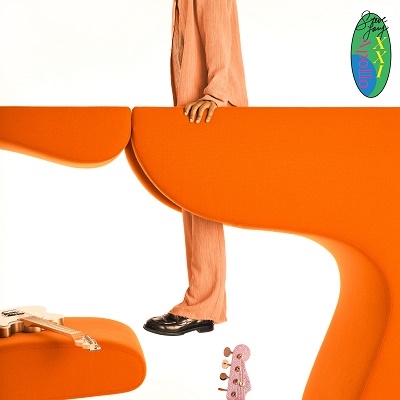ここ数年で最も重要なデビュー作として大絶賛の嵐!超人気バンド、ジ・インターネットの天才ギタリストにして、カリスマ・プロデューサー スティーヴ・レイシー1stアルバム発売決定!!
ジ・インターネットの中心メンバーにして、若干21歳の天才プロデューサーとしても賞賛を受けるスティーヴ・レイシーのソロ・デビュー・アルバムが、遂にフィジカル・リリース決定!ジ・インターネットでは、ギタリストとして活躍する一方、プロデューサーとしても、ケンドリック・ラマーの傑作『DAMN.』への楽曲提供で、グラミー賞にもノミネートされた他、ソランジュ、ダーティー・プロジェクターズ、ブラッド・オレンジらの楽曲をプロデュースし、ヴァンパイア・ウィークエンド最新作『Modern Vampires of the City』にも参加。まさに待望となる今作『Apollo XXI』は現代的で簡易な制作環境と、それによってさらに際立つ非凡なソングライティングの才能が絶賛され、ここ数年で最も重要なデビュー作として高く評価されている。
発売・販売元 提供資料(2019/10/01)
Clash - "The ambition behind Apollo XXI was already easily perceptible on singles like 'Playground', whose energy could best be termed 'Yung Prince'....In tandem with this growing self-assurance, his voice strides around, opting for falsetto, and sometimes for rapping."
NME - 4 stars out of 5 -- "On his likeable debut album, the Internet member and prolific collaborator balances wistful musical throwbacks with authentic lyricism and attitude..."
Rovi
The majority of the Internet's Grammy-nominated 2015 album Ego Death was produced by the band's newest addition, a high schooler named Steve Lacy. Word about the guitar-favoring instrumentalist quickly spread. Before he turned 21, Lacy had a hand in Top Ten pop LPs by J. Cole, Tyler, The Creator, Kendrick Lamar, Mac Miller, Solange, and Vampire Weekend, in addition to well-spent studio time clocked with fellow progressive artists including Kali Uchis, Blood Orange, and Ravyn Lenae. Lacy juggled this and more while participating in all manner of Internet (and related) projects, and in 2015 started releasing solo work. This included the "song series" Steve Lacy's Demo, six tracks recorded primarily with phone applications. Apollo XXI, his first album, is a little more refined, advancing his lazing, heartfelt mix of soul and funk with minimal varnish and no evident fuss. The rhythms have a rudimentary, still-demo-like charm, ranging from a functional plod to a hyperactive twitch. Lacy's thin but ringing vocals, often in mid-wattage falsetto, are finely matched with his pleasingly reedy guitar tone, suggesting a lovestruck stupor and other vaguely altered states. At times, he resembles the younger brother of Miguel or the introspective nephew of Van Hunt and Pharrell Williams (in N.E.R.D. fatigues). His voice is his own, brave enough to front-load his debut LP with a two-part, nine-minute number in which he writes about his gender-blindness and frets about being accepted by friends, family, and himself. That song's weight is immediately counterbalanced with the Jesse Boykins III collaboration "Playground," snappy and flirtatious funk drenched in echo, and a couple wham-bam dalliances that include the Dirty Mind-like "Guide." What follows largely sways and swoons, with Lacy's love takeovers and hangovers related in straightforward and sometimes silly terms. The chest-puffing finale verges on disposable, but it concludes by sliding into an extension of the redemptive "Exit Scott," one of Lacy's contributions to Solange's When I Get Home. ~ Andy Kellman|
Rovi
The majority of the Internet's Grammy-nominated 2015 album Ego Death was produced by the band's newest addition, a high schooler named Steve Lacy. Word about the guitar-favoring instrumentalist quickly spread. Before he turned 21, Lacy had a hand in Top Ten pop LPs by J. Cole, Tyler, The Creator, Kendrick Lamar, Mac Miller, Solange, and Vampire Weekend, in addition to well-spent studio time clocked with fellow progressive artists including Kali Uchis, Blood Orange, and Ravyn Lenae. Lacy juggled this and more while participating in all manner of Internet (and related) projects, and in 2015 started releasing solo work. This included the "song series" Steve Lacy's Demo, six tracks recorded primarily with phone applications. Apollo XXI, his first album, is a little more refined, advancing his lazing, heartfelt mix of soul and funk with minimal varnish and no evident fuss. The rhythms have a rudimentary, still-demo-like charm, ranging from a functional plod to a hyperactive twitch. Lacy's thin but ringing vocals, often in mid-wattage falsetto, are finely matched with his pleasingly reedy guitar tone, suggesting a lovestruck stupor and other vaguely altered states. At times, he resembles the younger brother of Miguel or the introspective nephew of Van Hunt and Pharrell Williams (in N.E.R.D. fatigues). His voice is his own, brave enough to front-load his debut LP with a two-part, nine-minute number in which he writes about his gender-blindness and frets about being accepted by friends, family, and himself. That song's weight is immediately counterbalanced with the Jesse Boykins III collaboration "Playground," snappy and flirtatious funk drenched in echo, and a couple wham-bam dalliances that include the Dirty Mind-like "Guide." What follows largely sways and swoons, with Lacy's love takeovers and hangovers related in straightforward and sometimes silly terms. The chest-puffing finale verges on disposable, but it concludes by sliding into an extension of the redemptive "Exit Scott," one of Lacy's contributions to Solange's When I Get Home. ~ Andy Kellman
Rovi
ジ・インターネットのギタリストとしてだけでなく、ケンドリック・ラマーら数々のアーティストの作品にも参加し、広くその名が知られるスティーヴ・レイシーのソロ作。グループのテイストも含みつつギターを主軸にしたローファイ感強めなサウンドでファンキーかつ気怠いレイシーの歌声を最大限に活かし、作品全体に幻想的な雰囲気を漂わせている。厳しい猛暑を乗り切る清涼剤としても効果的だ。
bounce (C)Masso187um
タワーレコード(vol.430(2019年8月25日発行号)掲載)



